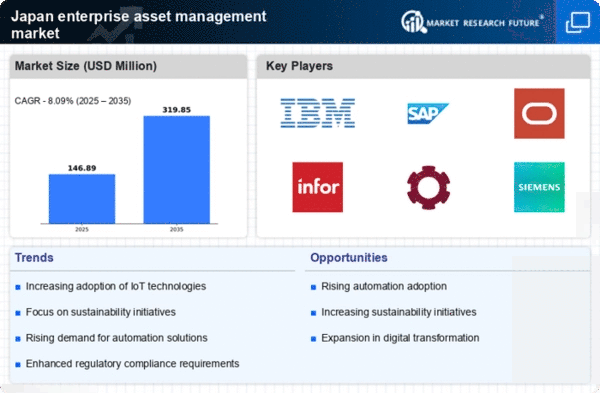Increased Focus on Data Security
Data security is becoming an increasingly critical concern within the enterprise asset-management market in Japan. As organizations adopt more sophisticated asset management systems, the risk of data breaches and cyber threats escalates. Consequently, there is a heightened focus on implementing robust security measures to protect sensitive asset-related information. Companies are investing in solutions that offer advanced security features, such as encryption and access controls, to safeguard their data. This trend is likely to drive growth in the enterprise asset-management market as businesses prioritize security in their asset management strategies. Moreover, regulatory pressures regarding data protection are further compelling organizations to adopt secure asset management practices, thereby reinforcing the importance of data security as a key driver in the market.
Regulatory Compliance and Standards
In Japan, the enterprise asset-management market is significantly influenced by stringent regulatory compliance requirements. Organizations are compelled to adhere to various standards, including safety regulations and environmental guidelines, which necessitate robust asset management practices. The need for compliance is driving investments in asset management systems that can ensure adherence to these regulations. As a result, companies are increasingly seeking solutions that provide comprehensive reporting and audit trails. The market is projected to grow as businesses recognize the importance of maintaining compliance to avoid penalties and enhance their reputation. Furthermore, the integration of compliance features into asset management software is becoming a standard expectation, thereby influencing purchasing decisions and driving growth in the enterprise asset-management market.
Shift Towards Sustainable Practices
Sustainability is emerging as a pivotal driver in the enterprise asset-management market in Japan. Companies are increasingly recognizing the importance of sustainable practices in their operations, which is influencing their asset management strategies. The push for sustainability is prompting organizations to invest in solutions that not only enhance efficiency but also minimize environmental impact. This trend is reflected in the growing demand for asset management systems that incorporate sustainability metrics and reporting capabilities. As businesses aim to align with national and international sustainability goals, the enterprise asset-management market is likely to see a surge in demand for solutions that support these initiatives. Furthermore, organizations that successfully implement sustainable asset management practices may benefit from improved brand reputation and customer loyalty, further driving market growth.
Rising Demand for Operational Efficiency
The pursuit of operational efficiency is a critical driver in the enterprise asset-management market in Japan. Organizations are increasingly focused on optimizing their asset utilization to reduce costs and improve productivity. This trend is particularly evident in sectors such as manufacturing and logistics, where efficient asset management can lead to substantial cost savings. According to recent studies, companies that implement effective asset management strategies can achieve up to a 15% reduction in operational costs. As businesses strive to enhance their competitive edge, the demand for solutions that facilitate better asset tracking, maintenance scheduling, and lifecycle management is likely to increase. This emphasis on efficiency is expected to propel the growth of the enterprise asset-management market as organizations seek to leverage technology to streamline their operations.
Technological Advancements in Asset Management
The enterprise asset-management market in Japan is experiencing a notable shift due to rapid technological advancements. Innovations in software solutions, particularly those integrating artificial intelligence and machine learning, are enhancing asset tracking and maintenance processes. This evolution is expected to drive market growth, with projections indicating a compound annual growth rate (CAGR) of approximately 8% over the next five years. Companies are increasingly adopting cloud-based solutions, which facilitate real-time data access and improve decision-making efficiency. Furthermore, the integration of IoT devices is enabling predictive maintenance, thereby reducing downtime and operational costs. As organizations seek to optimize their asset utilization, the demand for advanced asset management solutions is likely to rise, positioning technology as a key driver in the enterprise asset-management market.
















